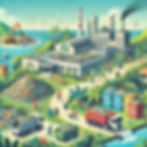The Crisis of Ineffective Waste Management in Dominica
- varietynewsgroup
- Jan 2
- 3 min read
Waste management is a cornerstone of public health, environmental preservation, and economic stability. Yet, in Dominica, it appears that the national waste management authority, Dominica Solid Waste Management Corporation (DSWMC), is struggling to provide effective solutions for the island’s growing waste disposal and recycling needs. This ineffectiveness has broad implications, from environmental degradation to public health concerns, and calls for urgent action.
The Scope of the Problem
Dominica’s waste management challenges are multifaceted. The island generates significant amounts of waste, including household garbage, agricultural by-products, and industrial refuse. Despite being a small island nation with limited land area, there seems to be a lack of adequate facilities and infrastructure to process and dispose of this waste responsibly. Reports of overflowing landfills, illegal dumping, and poor recycling rates paint a troubling picture.
Additionally, Dominica has positioned itself as an eco-friendly tourism destination, with a commitment to sustainability and environmental protection. The inability to manage waste effectively contradicts this image and threatens to undermine the country’s environmental and economic goals.
Causes of Ineffectiveness
Several factors contribute to the inadequacy of Dominica’s waste management system:
Limited Infrastructure: The island lacks modern waste management facilities, such as efficient recycling centers or waste-to-energy plants. The Roseau landfill, for example, has been reported to be nearing capacity, leading to a reliance on outdated and unsustainable disposal methods.
Inadequate Funding: Effective waste management requires substantial investment. However, it appears that DSWMC operates under tight budget constraints, limiting its ability to upgrade facilities or implement innovative waste solutions.
Public Awareness and Engagement: A lack of widespread education on waste separation and recycling further exacerbates the issue. Without public cooperation, even the best systems can fail to achieve their goals.
Regulatory Challenges: Enforcing laws and regulations against illegal dumping and other improper waste disposal practices has proven difficult, allowing these behaviors to persist.
Environmental and Health Impacts
The consequences of poor waste management are already visible. Overflowing landfills and illegal dumping sites contaminate soil and water sources, posing risks to Dominica’s biodiversity and human health. Decomposing waste releases harmful gases, such as methane, which contribute to climate change. Inadequate waste disposal also fosters breeding grounds for pests and diseases, creating public health hazards.
Potential Solutions
Addressing Dominica’s waste management crisis requires a multi-pronged approach:
Modernizing Infrastructure: Investing in state-of-the-art waste processing facilities, such as recycling plants and composting systems, can significantly reduce the burden on landfills.
Enhancing Public Awareness: Nationwide campaigns to educate citizens on the importance of waste separation, recycling, and responsible disposal practices can improve participation rates.
Strengthening Legislation: Implementing stricter penalties for illegal dumping and offering incentives for businesses and households that adopt eco-friendly practices could encourage better waste management.
Regional Collaboration: Partnering with neighboring Caribbean nations to share resources, technology, and expertise could help Dominica overcome its limitations.
Exploring Innovative Solutions: Waste-to-energy initiatives, such as converting refuse into electricity, could address the dual challenges of waste disposal and energy generation.
A Call to Action
The current state of waste management in Dominica highlights the urgent need for reform. While challenges abound, they are not insurmountable. With strategic planning, adequate investment, and collective effort, Dominica can transform its waste management system into a model of sustainability. Failing to act risks jeopardizing the island’s health, environment, and reputation as the “Nature Isle” of the Caribbean.


